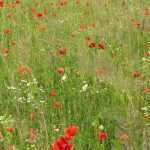Flowers and death
9th April and another anniversary of the death of the poet Edward Thomas, today marks ninety-nine years since his death. A married man of mature years, he had not needed to go to war, but after much soul-searching had enlisted in July 1915 as a private soldier in the Artists’ Rifles, a battalion of the London Regiment. He had risen to the rank of corporal before being commissioned as an officer in the Royal Garrison Artillery in November 1916. He was killed on Easter Monday 1917, shortly after he had arrived in France.
Thomas’ best known poem is “Adlestrop,” an extraordinary evocation of steam railways and the English shires in Edwardian England, it must be one of the most atmospheric poems written. Lamenting the appalling losses in the Great War, Thomas wrote “In Memoriam” at Easter 1915.
The flowers left thick at nightfall in the wood
This Eastertide call into mind the men,
Now far from home, who, with their sweethearts, should
Have gathered them and will do never again.
The War is not mentioned: the reference to the men “now far from home” is enough to bring a shadow as dark as nightfall across the minds of his readers; “and will never do again” makes clear the fate of those far from home, their bodies lying in ground where poppies were the only flowers that grew thickly.
Edward Thomas’ capacity to draw so sharp a contrast in the space of four lines, his capacity to move from flowers and Eastertide to loss and death in a few words, arose from from his personality, where in the space of a few moments he could shift from darkness to light, or, more ominously, he could move in the other direction, from light to darkness.
Suffering depression so deep that he was at the point of suicide on one occasion, Edward Thomas, nevertheless, feared that the loss of the darkness might bring a loss of the light; the absence of the depression that so afflicted him might bring an absence of creativity. In a letter to his friend Gordon Bottomley, he wrote,
“I wonder whether for a person like myself whose most intense moments were those of depression a cure that destroys the depression may not destroy the intensity – a desperate remedy?”
Is it the intensity of Edward Thomas’ work that has meant it has endured a hundred years, or the intensity of the context? Perhaps they are inseparable, perhaps any writing that endures is inseparable from its context. Maybe it is contexts that endure, flowers and death finding a resonance in 2016 that they found in 1915.



Comments
Flowers and death — No Comments
HTML tags allowed in your comment: <a href="" title=""> <abbr title=""> <acronym title=""> <b> <blockquote cite=""> <cite> <code> <del datetime=""> <em> <i> <q cite=""> <s> <strike> <strong>